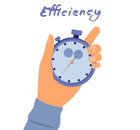What is a Scrum Master? Overview, Roles, and Responsibilities
The Scrum Master is a facilitator, coach, and the communication bridge the Scrum team needs for the effective execution of Scrum projects. Stick around to learn everything about the Scrum Master.

Agile methodologies have gained a central place in a wide range of industries due to their flexible and modernized development models. Scrum is the most popular Agile framework, offering businesses the flexibility to build and deliver top-notch products. It empowers businesses to stay ahead in the competitive era and market products faster. Today, around 87% of organizations use Scrum as their Agile framework.
For organizations adopting the Scrum framework, they need a Scrum expert called the Scrum Master, as it helps them properly implement the Scrum. Therefore, this guide is all about what a Scrum Master is. Here, we will cover in detail the Scrum Master's roles and responsibilities and other valuable details.
What is a Scrum Master?
At its core, a Scrum Master is a facilitator and coach for the Scrum team. They are the driving force behind the successful implementation of Scrum, guiding the team and the organization in understanding and adopting Scrum theory, values, and practices.
The Scrum Master helps the development team collaborate with other organization members, like Product Owner and stakeholders. They also help the development team work more proficiently by assisting them in removing obstacles/distractions that compromise their productivity.
A Scrum Master possesses practical, soft skills to act as the interface between the Scrum team and other people/teams. Overall, the position of a Scrum Master looks narrow in scope, but it has significant influence across the organization. It is a work-from-behind role that does not involve product strategy but plays a key role in high-quality product deliveries.
Why is the Role of the Scrum Master Important?
To understand the role of the Scrum Master, we should quickly grasp the workings of the Scrum framework.
In Scrum, the Product Owner submits a request (product backlog) and the development team (led by a Scrum Master) breaks the product backlog into smaller pieces called "Sprints" during sprint planning meetings. Afterward, the team holds a batch of sprints to complete the development of the product backlog items. After each sprint, the team also conducts sprint review and sprint retrospective meetings.
In all the above stages of Scrum-based product development, the Scrum Master plays a central role. They not only coordinate project activities between the Scrum team and other people/teams but also ensure that all the Scrum processes and practices are followed. Furthermore, they also guide and facilitate the development team when asked, and even remove obstacles and foster collaboration. So, the role of the Scrum Master is crucial to ensure that the Scrum framework is implemented effectively.
Roles and Responsibilities of a Scrum Master
A Scrum Master has specific roles and responsibilities to fulfill in the Scrum team and the broader organization. Below is a quick glimpse of all the key roles/responsibilities of a Scrum Master:
1. Facilitate the Scrum Process
The pivotal role of the Scrum Master is to ensure that the Scrum team follows the Scrum process effectively. This involves ensuring that all Scrum events, practices, and values are being followed as per the Scrum guidelines.
Some of the responsibilities in this perspective include:
- Facilitate daily standups (Daily Scrum) and keep the meeting short and on point.
- Protect the team from scope creep or over-committing during sprint planning meetings.
- Participate in sprint review meetings and gather feedback.
- Note down improvement areas and action items for upcoming sprints in sprint retrospectives.
In short, the Scrum Master is a facilitator for all the essential Scrum events and makes sure the team gets the best out of those events. However, the Scrum Master is also adaptable where required. For instance, if the Scrum team wants to estimate the product backlog before sprint planning using the Planning Poker or Async Poker estimation technique, the Scrum Master can be a facilitator here as well.
2. Coach the Team
The Scrum Master coaches the Scrum team. They teach them about Scrum principles and practices, help the team self-organize, adhere to Scrum best practices, and continuously improve processes. However, don't confuse coaching with direct interactions.
The Scrum Master is not the boss of the team. To better understand, consider the Scrum Master's role during meetings. The Scrum Master's main role is facilitating the meetings and acting as a "listener". The team is empowered to make their own decisions about the project/priorities, while the Scrum Master notes down the decisions and ensures that the team sticks to the plan.
3. Facilitate Communication
The Scrum Master is the key to smooth and fruitful communication between the Scrum team, the Product Owner, and other stakeholders. They will interact with the Product Owner to discuss/understand the product vision, facilitate in creating/prioritizing the backlog, etc. They also communicate the issues raised by the development team with the Product Owner, stakeholders, or other authorities.
Simply put, the Scrum Master fosters a collaborative environment by facilitating timely discussions, ensuring transparent progress, and clarifying expectations. In short, the Scrum Master plays a leading role in maintaining a strong collaborative relationship among the Scrum team and stakeholders.
Read more: How Product Owner and Scrum Master Can Contribute to Effective Product Backlog Management
4. Remove Obstacles and Distractions
Sometimes, the development team faces a challenge or bottleneck that hinders them from completing the sprint task. In such scenarios, the Scrum Master is responsible for clearing the obstacle.
Similarly, the Scrum Master also handles the extra pressure from higher authorities. For instance, if the stakeholders ask the development team to include an additional feature in the sprint, the Scrum Master can remind them that the team will only complete the agreed task in the current sprint.
Obstacles and distractions can compromise the sprint's productivity and outcomes. A well-trained Scrum Master can eradicate such obstacles and ensure the team remains productive.
5. Promote Continuous Improvement
One of Scrum's functional practices is a continuous improvement culture. Scrum urges the team to continuously evaluate its performance and look for ways to improve it. The Scrum Master promotes this mindset within the team. They facilitate sprint retrospective meetings so that the team can self-identify improvement areas and create action plans. Afterward, the Scrum Master ensures that the team adheres to those action plans.
Since Scrum Master is also a coach, they encourage the team to innovate, experiment, and learn to continuously grow and develop.
Read More: Dos and Don'ts of a Scrum Master
Scrum Master vs Project Manager: Key Differences?
There is a common misconception about the role of the Scrum Master and the project manager. The first thing to understand is that both roles are different. Secondly, they have a different set of responsibilities to fulfill.
Below are the key differences between Scrum Master and Project Manager that will clarify their roles:
- Project Capabilities: The Scrum Master facilitates Agile/Scrum-based projects, while the project manager is a universal role that can be served in almost any project type.
- Focus: The Scrum Master's focus is on ensuring the team adheres to the Scrum principle and facilitating communication. The project manager manages the whole project, including planning, management, communication, delivery, feedback, and more.
- Meetings: The Scrum Master facilitates team meetings but mostly acts as a listener. The project manager arranges and leads the meetings.
- Team Size: The Scrum Master works in a small Scrum team, while the project manager can handle large or multiple teams.
- Contribution: The Scrum Master contributes to quality and scope management, while the project manager contributes to all areas of project management.
In short, the Scrum Master is the coach and helping hand for the self-organizing Scrum team. In contrast, the project manager is the main person who handles the whole project, assigns work to the team, and is responsible for the project's success.
Read More: What is Not the Responsibility of Scrum Master?
7 Key Skills of a Scrum Master
When a Scrum Master has different crucial roles and responsibilities to fulfill, it means they should also possess diverse skills. Some of the key skills of a Scrum Master are as follows:
- Leadership: They possess leadership skills and lead the team to be self-organizing, collaborative, and productive.
- Effective Communicator: They are skilled communicators who ensure clear and open communication within the team, with the Product Owner, and with stakeholders.
- Excellent Coach: They are the coaches the Scrum team needs to improve their Scrum development practices.
- Problem Solver: They are the team's product solvers. They handle conflicts, bottlenecks, disagreements, or external pressure to keep the team focused, supportive, and productive.
- Empathy: They understand and empathize with the team's challenges and motivate them during complications.
- Adaptable: They are open and adaptable to changes to meet the project or team's needs.
- Time Manager: They possess skills in excellent time management to ensure the team is in line with deadlines and sprint goals.
In short, the Scrum Master possesses all the exceptional skills a leader/facilitator/coach should have to fulfill the responsibilities efficiently.
Read more: How to make remote Scrum Master role work?
Wrapping Up
Scrum Master is an important and a must-have role for organizations deploying the Scrum framework. They are the facilitator the Scrum team needs to adhere to Scrum, communicate effectively, and remain productive even in challenging situations. Furthermore, they are the bridge that facilitates communication between the Scrum team, Product Owner, and stakeholders. Therefore, it is important for organizations to hire a well-trained Scrum Master who can play a pivotal role in the success of Scrum-based projects.





